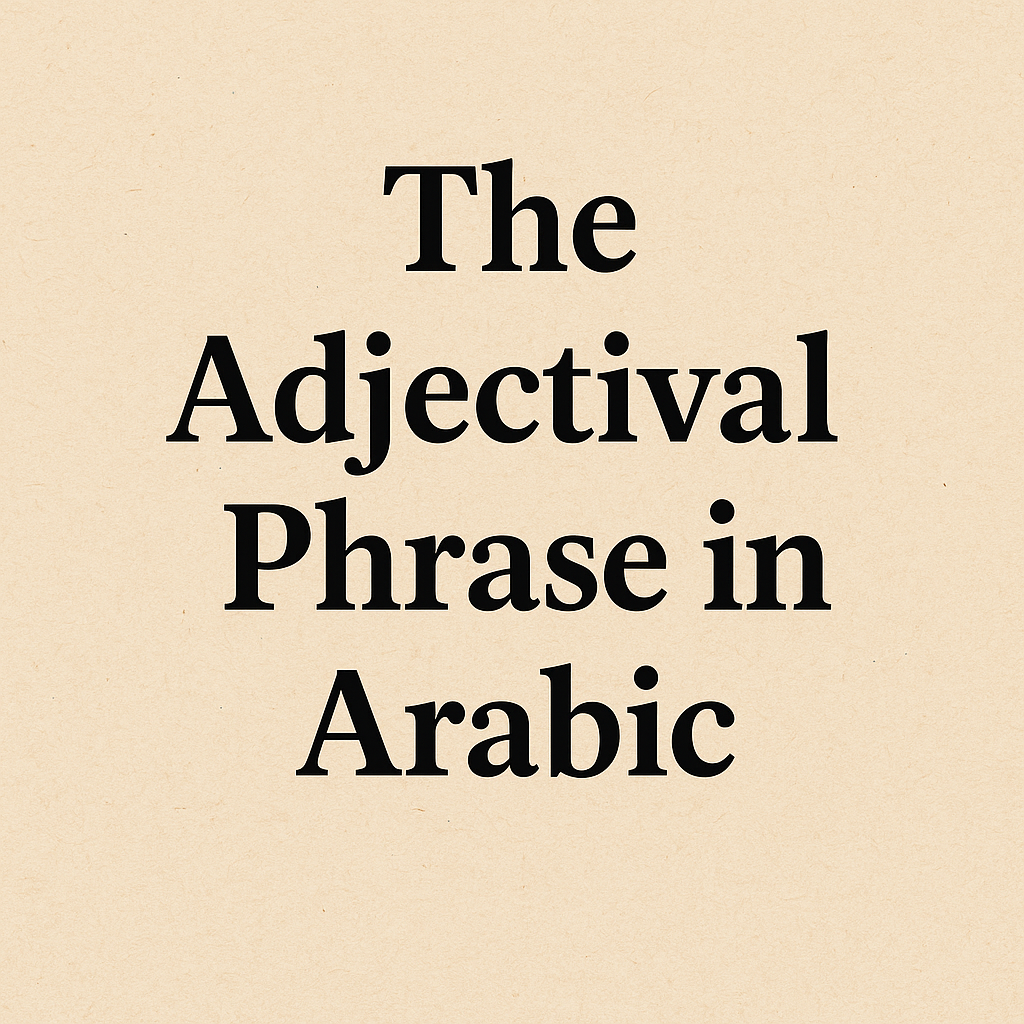The Adjectival Phrase in Arabic: A Clear Guide for Non-Native Speakers

When learning Arabic as a non-native speaker, understanding sentence structures and phrase types is key to mastering the language. One of the most essential building blocks for both beginners and intermediate learners is The Adjectival Phrase in Arabic. These phrases play a critical role in describing, modifying, and clarifying nouns — making your Arabic more vivid and expressive.
In this comprehensive guide, we will explore what adjectival phrases are, how they work in Arabic, and how to use them correctly. By the end of this article, you will have a strong understanding of The Adjectival Phrase in Arabic, complete with real examples and tips. Whether you’re a self-learner or studying through an institute, this guide will boost your confidence.
And if you’re looking for expert instruction with a personal touch, Al Arabiya Institute offers online Arabic courses at the best prices and free trial lessons — perfect for learners like you.
What is an Adjectival Phrase in Arabic?
In English, an adjectival phrase is a group of words that describe a noun. Similarly, in Arabic, The Adjectival Phrase in Arabic (العبارة الوصفية) functions as a way to describe a noun or pronoun, giving more information about it.
The most common form of an adjectival phrase in Arabic consists of a noun followed by an adjective that agrees with it in gender, number, case, and definiteness. For example:
-
رجل طيب – a kind man
-
امرأة جميلة – a beautiful woman
-
السيارة الجديدة – the new car
In each case, the adjective (طيب، جميلة، الجديدة) comes after the noun and reflects its grammatical features. This is a fundamental rule in The Adjectival Phrase in Arabic and must be understood clearly.
Grammatical Agreement in Arabic Adjectival Phrases
One of the distinct features of The Adjectival Phrase in Arabic is full agreement between the noun and the adjective. The adjective must match the noun in four grammatical aspects:
-
Gender (Masculine or Feminine)
-
Number (Singular, Dual, or Plural)
-
Case (Nominative, Accusative, or Genitive)
-
Definiteness (Definite or Indefinite)
Let’s break this down with examples:
1. Gender Agreement
-
ولد صغير – a small boy (masculine)
-
بنت صغيرة – a small girl (feminine)
2. Number Agreement
-
رجلان طيبان – two kind men (dual)
-
رجال طيبون – kind men (plural)
3. Case Agreement
Depending on its position in the sentence, the case changes:
-
هذا كتابٌ مفيدٌ – This is a useful book (nominative)
-
رأيتُ كتابًا مفيدًا – I saw a useful book (accusative)
-
تحدثتُ عن كتابٍ مفيدٍ – I spoke about a useful book (genitive)
4. Definiteness Agreement
-
بيتٌ كبيرٌ – a big house (indefinite)
-
البيتُ الكبيرُ – the big house (definite)
These agreements make Arabic both rich and precise. With practice, they become second nature, especially when guided by structured lessons such as those offered by Al Arabiya Institute.
Word Order in Arabic Adjectival Phrases
Unlike English, where adjectives come before nouns (e.g., “a red car”), Arabic follows the opposite pattern. The adjective always follows the noun it describes.
Examples:
-
قصة مشوقة – an exciting story
-
المدينة الكبيرة – the big city
This reversal of word order is one of the first adjustments learners must make when mastering The Adjectival Phrase in Arabic.
Using Multiple Adjectives in Arabic
When using more than one adjective to describe a noun, all adjectives must agree with the noun and follow in sequence.
Example:
-
طالب ذكي مجتهد – a smart, hardworking student
In this case, both adjectives (ذكي and مجتهد) describe the noun طالب and follow the noun in proper order and agreement. Keep in mind that The Adjectival Phrase in Arabic maintains the noun-adjective structure no matter how many adjectives are used.
Definite vs. Indefinite Adjectival Phrases
This distinction is critical. When the noun is definite, the adjective must also be definite. If the noun is indefinite, the adjective must be indefinite too.
Indefinite:
-
كتاب جيد – a good book
Definite:
-
الكتاب الجيد – the good book
Failure to match definiteness makes the phrase grammatically incorrect. This is one of the most common mistakes beginners make when forming The Adjectival Phrase in Arabic, but it’s easy to correct with guidance and practice — something that’s well-covered in online courses at Al Arabiya Institute.
Using Adjectival Phrases in Real Sentences
Here are a few full sentences showing The Adjectival Phrase in Arabic in context:
-
أشتري حاسوبًا حديثًا.
I’m buying a modern computer. -
رأينا المنظرَ الرائعَ من النافذة.
We saw the wonderful view from the window. -
يسكن في بيتٍ قديمٍ.
He lives in an old house.
By analyzing these examples, you’ll see that the adjective follows the noun and matches it grammatically in every case. This consistency makes The Adjectival Phrase in Arabic a predictable and teachable structure for learners.
Tips for Mastering the Adjectival Phrase in Arabic
-
Practice with Simple Noun-Adjective Combinations
Start with easy vocabulary: سيارة جميلة، كتاب ممتع، طعام لذيذ. -
Pay Attention to Definite vs. Indefinite Forms
Drill yourself on how the definite article (ال) affects both the noun and adjective. -
Use Real-life Contexts
Describe things around you using adjectival phrases. For example: الجو جميل اليوم – The weather is beautiful today. -
Get Professional Feedback
Enrolling in structured lessons helps correct mistakes early and builds confidence. This is exactly what you get when you sign up at Al Arabiya Institute.
Learn More with Al Arabiya Institute
Learning Arabic can be deeply rewarding, especially when you grasp foundational grammar concepts like The Adjectival Phrase in Arabic. Whether you’re just beginning or looking to sharpen your skills, guided practice makes all the difference.
That’s where Al Arabiya Institute excels. With:
-
Experienced Arabic teachers
-
Courses tailored for non-native speakers
-
Flexible online scheduling
-
Affordable pricing
-
Free trial lessons
…it’s one of the best platforms for learning Arabic online.
You don’t have to navigate Arabic grammar alone. Whether it’s understanding The Adjectival Phrase in Arabic or diving into advanced grammar, Al Arabiya Institute provides you with expert instruction in a learner-friendly environment.
Conclusion
Mastering The Adjectival Phrase in Arabic is a fundamental step in speaking and writing accurately. By focusing on grammatical agreement, word order, and real-life usage, you can elevate your Arabic to a new level.
Remember, consistency and the right guidance are essential. For structured lessons that break down complex grammar into easy, digestible units, Al Arabiya Institute is your go-to choice. Sign up today to start your journey with a free trial and discover the best way to learn Arabic online at unbeatable prices.
👉 Visit Al Arabiya Institute and book your free trial lesson now!








